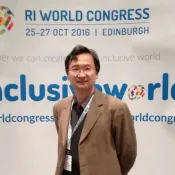Strategic Focus for State of the Worlds Volunteerism Report Research: Unveiling the Next Frontiers
About the discussion group
The State of the World’s Volunteerism Report (SWVR) serves as a guiding beacon, illuminating the global landscape of volunteerism and offering insights that shape policies, inspire action, and celebrate the remarkable contributions of volunteers worldwide.
In this discussion, let's explore a pivotal question that steers the trajectory of SWVR: "Which research areas or thematic domains should be the focus of SWVR?" As we collectively envision the future of volunteerism, it's vital to identify and prioritize research domains that will profoundly impact global development.
Recognizing the dynamic nature of volunteerism and the need for continuous adaptation, we invite you to share your expertise, experiences, and visions for the future of SWVR research. This collaborative dialogue in our virtual space will shape the trajectory of volunteerism research, ensuring responsiveness to the ever-changing global context.
As we stand on the brink of new possibilities, it is crucial to collectively envision the horizons that SWVR should navigate. What are the emerging trends, challenges, and opportunities in the landscape of volunteerism that deserve our focused attention?
Join us in unveiling the next frontiers that SWVR should explore, not only to reflect the present state of volunteerism but also to anticipate and influence its future. Let's engage in a rich and collaborative dialogue that shapes the course of volunteerism research.
Key Questions:
- What research areas do you believe are currently underrepresented in the field of volunteerism?
- How can SWVR research contribute to bridging gaps in our understanding of volunteerism and its impact on communities?
- Are there specific regions or demographics that should receive more attention in SWVR research?

1. About underrepresented in the field of volunteerism
In the past, many volunteer services were serving the elderly. However, with the aging process, many elderly people have also joined volunteers and actively participated in volunteer services. From the perspective of active ageing, it is recommended that subsequent SWVR reports consider including more cases of this kind of intergenerational well-being, which is very helpful for social integration and the construction of an inclusive society.
2. About How can SWVR research contribute to bridging gaps
If we want the SWVR report to further exert its influence, on the basis of summarizing the general model of volunteer services, we need to consider more localized volunteer service cases, especially the similarities and differences in the implementation of a certain type of volunteer service projects in different countries and regions, that is, how to combine volunteering with local culture. For example, volunteer services in China rely heavily on the traditional culture of mutual aid and indirect reciprocity.
3. About regions or demographics that should receive more attention in SWVR research
Statistics are the basis of any report, especially socio-demographic data. In addition to census data and population forecast data, the SWVR report can absorb more representative survey data from different countries, such as the American Time Utilization Survey (ATUS), which contains time indicators for volunteering. Also, some comprehensive social surveys include indicators on volunteer services, such as the China Health and Retirement Longitudinal Study (CHARLS). Of course, the most important thing about population research is to go beyond numbers and discover the stories hidden behind the numbers. It may not be very meaningful to compare the data directly, it is important to understand why the numbers change in different regions.

1. Technology and Innovation
We can explore the role of technology in volunteerism, including the impact of digital platforms, social media, and other technological tools on volunteer engagement and community impact. Understanding how technology can enhance or hinder volunteer efforts can inform the development of effective strategies, particularly in regions or demographics where digital literacy and access to technology may be limited.
2. Youth and Seniors
While there is some research on youth volunteerism, more attention could be given to understanding the unique motivations and challenges faced by young volunteers. Similarly, exploring the motivations and experiences of senior volunteers in addressing community needs and maintaining social connections, in the context of an aging population, is important
3. Intersectionality and Inclusivity
Research could delve into the experiences of volunteers with diverse identities, considering factors such as race, gender, age, and socioeconomic status. Understanding how these intersecting identities influence volunteer engagement and experiences can contribute to more inclusive volunteer programs. Explore strategies to promote inclusivity and address inequities in volunteer engagement.

In reply to (No subject) by Tuesday@

In reply to (No subject) by Tuesday@
Abut study of the motives of the young, the elderly and, I will add, people of working age.
The topic is important, without a doubt. Let's imagine that by some means we have identified the motives of young people and elderly citizens, as well as the problems they face in their work. In this row we can add the employees of companies, firms, organizations, that is citizens of working age, Thus, the task is to study the motives and problems of volunteers of all ages.
So, let's assume that we manage to obtain data on the motives and problems of volunteers of all ages,
But then several questions arise:
How are the findings used?
What is the number of countries in which the motives and problems of the groups listed above have been measured?
Are the results widely presented in society?
What might a full-fledged model for measuring the motivations and concerns of volunteers of all ages look like?
Another question concerns the utilization of this valuable resource. ILO/UNDP studies carried out between 2007 and 2017 show that these results have been underutilized in many countries. At the same time, there are certainly countries where there is a full-fledged practice and experience of using these resources. Therefore, it is necessary to study the existing experience, and in its absence to develop a model for measuring the motivations and problems of volunteers in the implementation of volunteer work in the framework of the Report.
Another question:
How should this valuable data be presented in the global Report 2025? My opinion: to invite organizations that have positive experience in this field to cooperate, to hold a discussion within the framework of our work on the Report in order to analyze and refine methodologies for researching the motives and problems of volunteers.
The results obtained should be presented in the Report in the section "Review of national practices".
It seems to me that the proposed questions in aggregate are important and require our attention in order to work together to find answers.

In reply to (No subject) by Tuesday@

In reply to (No subject) by Kamuruko
I suggest that we include research in the following areas to provide valuable insights into the dynamics of elderly volunteering and their contribution to the development of effective policies and programs
1. Policy and Support Systems
How do existing policies and support structures encourage or hinder elderly volunteering? What are the areas for improvement?
2. Barriers and Enablers
What are the obstacles preventing elderly individuals from volunteering? What factors facilitate their active participation?
3. Inter-generational Dynamics
What sort of interactions exist between elderly volunteers and younger generations? Are there mutual learning and support mechanisms? How can this be improved?
4. Skills and Experience Transfer
How do elderly volunteers transfer knowledge and skills to younger generations? How does this contribute to sustainable development?
5. Impact on Community Development
How do elderly volunteers contribute to community projects, infrastructure, and overall development? Is their contribution visible and appreciated? How can we improve on this?
6. Health and Well-being
What are the physical and mental health benefits for elderly volunteers? Is there a reciprocal relationship between volunteering and well-being?
7. Social Integration
What is the role of volunteering in fostering social connections among the elderly and its impact on reducing isolation and loneliness?
8. Cultural Perspectives
What are the cultural attitudes towards elderly volunteering? How do traditional values influence the engagement of older individuals in volunteer activities?

Firstly, the legalization of volunteer services is paramount. This approach ensures a structured, secure environment for volunteers, fostering growth and long-term engagement. Our upcoming SWVR report should emphasize a global evaluation of volunteer service legislation, detailing the progress and content of laws in various regions. By assessing these legal frameworks, we can better understand and showcase the legal protections and support available to volunteers worldwide. This legal perspective not only legitimizes volunteer efforts but also encourages more people to participate, knowing they are operating within a safe and regulated environment.
Secondly, the impact of volunteer services on sustainable development cannot be overstated. While environmental volunteerism directly contributes to this goal, we must recognize that all forms of volunteerism play a significant role in fostering sustainable growth. From social to economic aspects, volunteer efforts drive progress across all sectors. Moreover, linking volunteer services to climate action presents a novel approach to sustainability. By correlating volunteer efforts with individual carbon footprints and carbon taxation, we can incentivize diverse forms of volunteerism as a means to offset personal carbon emissions. This approach not only highlights the importance of volunteer services in a broader context but also aligns volunteer efforts with pressing global challenges like climate change.
In conclusion, as we shape the 2025 SWVR, let us focus on these two pivotal areas: legalizing volunteer services and integrating volunteerism within the broader framework of sustainable development. This approach will not only enrich our understanding of global volunteerism but also elevate its impact in addressing some of the most pressing challenges of our time.
In reply to (No subject) by chengmzhang
Expanding on your thoughts:
Legalization of Volunteer Services: I agree that a global evaluation of volunteer service legislation would be invaluable. This could analyze factors like volunteer rights and responsibilities, organizational obligations, and dispute resolution mechanisms. It would be crucial to examine both progressive legal frameworks and existing gaps, identifying opportunities for advocacy and policy improvements. This legal analysis could be coupled with case studies showcasing how established legal frameworks have fostered successful and impactful volunteer programs.
Volunteerism and Sustainable Development: Your point about all forms of volunteerism contributing to sustainable development is crucial. The SWVR could explore the diverse ways volunteer efforts across social, economic, and environmental spheres can contribute to the SDGs. One interesting angle could be examining how volunteerism strengthens community resilience, adaptability, and capacity, which are key elements of sustainable development.
Volunteerism and Climate Action: Linking volunteer services with individual carbon footprints and carbon taxation is an innovative approach. The SWVR could explore the feasibility and potential impact of such initiatives, considering factors like volunteer motivation, program design, and measurement methodologies. It would be important to evaluate both potential benefits and challenges of this approach, ensuring its effectiveness and ethical implementation.

In reply to (No subject) by chengmzhang

I'm Aminu Abubakar from Taraba State Nigeria, I will like to know where and how to go about it I will be very happy if I'm guided.
+2348160721155 or Email murzanatuaminubakenterprises@gmail.com
Thank you all.

In reply to (No subject) by Aminu081@
What research areas you believe are currently underrepresented in the field of volunteerism?
How can SWVR research contribute to bridging gaps in our understanding of volunteerism and its impact on communities? or if there are specific regions or demographics that should receive more attention in the upcoming SWVR 2025?

In reply to (No subject) by Aminu081@

I am also honored to join the dialogue and the upcoming work on the 2025 Report. For the last two days I have spent all my free time studying all the posts in the two discussions and I find many interesting ideas and suggestions in them. Already soon I will prepare my opinion, suggestions and my thoughts on many issues.
All the best to everyone!

In reply to (No subject) by Galina.Bodrenkova

In reply to (No subject) by totel17@gmail.com
Relevance to Global Challenges: The focus areas should align with pressing global challenges, addressing issues that are pertinent to sustainable development, social justice, and humanitarian efforts. This ensures that the SWVR remains a valuable resource for addressing critical issues.
Inclusivity and Diversity: A comprehensive approach that encompasses a diverse range of themes ensures inclusivity and relevance. Consideration should be given to a variety of sectors, regions, and populations to capture the richness of volunteerism's impact.
Emerging Trends in Volunteerism: The report should explore emerging trends in volunteerism, reflecting the evolving nature of civic engagement. This might include examining the role of technology, new forms of volunteering, and innovative approaches to community involvement.
Cross-Sector Collaboration: Emphasizing research areas that encourage cross-sector collaboration is vital. Volunteerism often involves partnerships between governments, NGOs, businesses, and communities. Understanding and promoting effective collaboration is essential for sustainable impact.
Measuring Impact and Outcomes: A focus on research areas that allow for the measurement of impact and outcomes is critical. This includes developing methodologies and metrics that can effectively quantify the contributions of volunteers to societal well-being.
Capacity Building and Empowerment: Research areas should explore how volunteerism contributes to capacity building and empowerment, both for individuals and communities. This includes understanding how volunteers can be catalysts for positive social change.
Environmental Sustainability: Given the increasing importance of environmental issues, exploring how volunteers contribute to sustainability and environmental conservation can be a pertinent research theme.
Crisis Response and Resilience: Understanding the role of volunteers in crisis response, disaster management, and building community resilience is crucial. This research can shed light on effective strategies for leveraging volunteer efforts during challenging times.
Innovations in Volunteer Management: Investigating innovative approaches to volunteer management, recruitment, and retention can enhance the efficiency and effectiveness of volunteer programs.
Social Inclusion and Equity: Examining how volunteerism can contribute to social inclusion, address inequality, and promote diversity ensures that the SWVR addresses issues related to equity and justice.
Youth Engagement: Given the energy and enthusiasm of the youth, exploring how volunteerism engages and empowers young people is essential. This includes understanding the impact of youth-led initiatives and their contribution to sustainable development.

In reply to (No subject) by jamesk
Thanks for taking the time to proffer your perspectives and suggestions on the next SWVR edition. The essence of this exchange process is an effort to get as diverse and varied global ideas on trends in volunteering to ensure that the report is relevant and brings out new evidence that would inform the integration of volunteerism in development policies and frameworks. Some of the topics that you have outlined such as measurement impact and outcome are at the core of this edition of the SWVR. , whose central theme is measurement. Furthermore, the areas of Social Inclusion and Equity including Inclusivity and Diversity are persistent areas of interest for research. In the SWVR 2022 edition, these areas were discussed, and I think more research is needed. We are putting together all the suggestions coming from this consultation and will be discussed in detail to shape the final research components for the report. Thank you again James!,,, Regards Tapiwa.

- Each interested country to obtain significantly more accurate quantitative and qualitative data, which will make it possible to show what the contribution of volunteers is and how this contribution affects national and global development.
- Eliminate the problem of incomparability of data with global statistics by allowing the use of effective tools and methodologies based on the approaches and tools in the ILO-UNV Guidelines (2011, 2021).
At the same time, it is important that SWVR-2025 becomes a practical tool to measure qualitative and quantitative indicators at the level of an individual country (for the volunteer, for the local community, for national development), and in aggregate for global development and for accelerating the processes of achieving the SDGs.
The areas selected in the Report's Concept Note on which work is to be done are extremely relevant:
- research on the values of the individual volunteer and their potential;
- research on the role of volunteers for the communities and societies in which they work;
- the contribution or value of volunteering to national public goods;
- the economic value of volunteering
- the impact of volunteering on the processes of achieving the SDGs.
Together, the SWVR -2025 development process will form the basic framework for the development of the Volunteering Index.
What could be the sections of the Report?
1. General overview article (introduction of the Report)
2. Critical analysis of the problems in modern volunteerism or where we are moving from and where we are going. Perhaps examples of national practices from different countries;;
3. A comprehensive volunteerism measurement system (practically a toolkit based on the ILO-UNV Manuals.
4. Methods to measure the contribution of volunteers to the SDGs.
5. Volunteerism Index. What it is and how it works.
Underrepresented or completely unrepresented groups
1. Direct volunteerism
2. Non-volunteer groups.
While direct volunteering has recently come to the attention of researchers, non-volunteer groups are completely unrepresented (i.e. excluded from the household-based labor force survey methodology). .
Non-volunteers are people who for various reasons do not participate in volunteer work A survey of such groups by including several questions, for example, in an additional module developed by ILO/UNV, could seriously contribute to increasing the number of volunteers at the local, national and global levels, to the formation of policy towards volunteers, and to the development of a strategy for the development of volunteering.
I propose to analyze non-volunteers by analogy with the methodology of measuring underutilized labor force. Such groups in aggregate can be called the underutilized component of volunteerism.
Note: probably not an exact translation to English

In reply to (No subject) by Galina.Bodrenkova
I am interested in the relationship between gender and volunteering, and I aim to study the impact of gender on participation in volunteer activities along with relevant social and cultural factors. I am aware that there may be differences between genders in terms of the types of volunteering activities, time commitment, and motivations. I hope to uncover the reasons and implications behind these differences through this discussion. Besides, I am interested in the motivations, experiences, and impacts of youth engagement in volunteering. I aim to explore how meaningful volunteer opportunities can be provided to young individuals to foster personal growth, skill development, and social participation, which will offer meaningful opportunities, and recognize the contributions of young volunteers. Especially in south-South Cooperation and Volunteering.

In reply to (No subject) by zhengguangliu


I think a fundamental research area is the role of policy, policy makers and implementers in enhancing volunteerism for the SDGs and Volunteering towards creating resilient communities especially at the grassroots level.

A unified approach to measuring volunteer work identifies virtually all persons engaged in volunteer work, which is not done with reliable accuracy and precision if measurements are made by collecting data through registered organizations. More importantly, we can measure both volunteering through organizations (organized volunteering) and informal (direct) volunteering with equal accuracy. At the same time, using a single measurement system will solve the problem of comparability of national data with the overall global statistics.
Thus, all key indicators of volunteerism can be measured using a single measurement system similar to the household-based labor force survey methodology. Given the cumbersome nature of the labor force survey questionnaire, perhaps the volunteer work measurement system should not be directly embedded in the labor force survey system, but used separately (perhaps in the following week of the labor force survey week and administered to the same households).
Thus, it is advisable to take as a basis the ILO and UNV guidelines (2011 and 2021), which we can discuss together, finalize, adjust, make various changes, add modules on different topics. It will be extremely important that we discuss and finalize a single document, moving towards a Comprehensive Volunteer Measurement System, which is an important objective of the 2025 Report.

1. The key concepts used in the Report (volunteering, volunteer work, values of volunteerism, qualitative indicators, etc.) should be finalized. All concepts used should be clearly stated and understood.
2. Volunteering activities are not linked and mapped to the SDGs. At least a few SDGs such as SDG 1, 2, 3, 4, 8,11 etc. can be linked to volunteer work;
3. Mechanisms and technologies for cooperation between parties (state, civil society organizations, commercial organizations) in measuring volunteer work have not been researched and developed. In my opinion, at the national level, for the purposes of measuring volunteerism indicators comparable with global statistics, it is necessary to cooperate statistical authorities with academic institutions and civil society organizations engaged in measurement. At the global level it is extremely important cooperation of the largest organizations UN Volunteers, IAVE, Forum VGA, working in the field of volunteerism in partnership with their national networks.
4. Underrepresented groups.
An approach is proposed to expand the national dataset by including previously uncounted or under-represented groups in the survey. These groups, which we can discuss and seek solutions to in our future work, include:
The group of volunteers who provide direct help to people in need, nature or the communities in which they operate has not been explored;
Not explored is the group of people not participating in any unpaid work for others (non-volunteers). Research into the reasons why people do not participate in volunteer work will help to develop strategies to engage new volunteers in important issues locally, nationally and globally.
The group of benificiaries who are helped by volunteers has not been researched. This is a very interesting new issue that could also be measured through a household survey system. This will make it possible to obtain, through the beneficiaries' opinion, an assessment (quantitative and qualitative) of the volunteer assistance provided
Surveying and analyzing all of these unaccounted groups could be a very important source of data with which to develop strategies and tools to engage previously uninvolved people in volunteering.

Regarding key question #1, I believe that inclusive volunteering, especially by persons with disabilities, and digital volunteering, also known as online or cyber volunteering, are currently not widely presented.
I also think it is very important that informal, unorganized volunteering should be clearly described in the report. This could be the first serious step towards studying this phenomenon on a global scale. In this regard, I expect to get to know the details on joint research methodology of ILO and UNV in the near future.
Regarding key question #2, the research will contribute to filling gaps in our understanding of volunteering and its impact on communities by clarifying for the general public the similarities and differences between volunteer work, volunteer services, volunteer activities and volunteer efforts. The report should clearly define and describe volunteering as the helping behavior of individuals and groups of people based on non-profit mutual aid and altruism.
Regarding attention in SWVR research, I'm not yet sure that a detailed review of existing legislation in a hundred countries will reveal anything valuable. Laws are different everywhere, so it is better to show in general terms what happens where the specific law supporting volunteering exists and what happens where it does not.
In general, I would like to find in SWVR 2025 as many points of differentiation of volunteering in specific regions, countries, nations, cultures as possible.
Discussion Moderators


Discussion Members











How to join
- Create a user account here
- Once your account has been activated, log in here (please make sure to check your spam).
- Then go this discussion forum
- Select the second tab, 'Discussion' to leave a comment and engage with other participants.
- For any technical issues, contact us here

Today, we embark on a journey that seeks to answer a pivotal question:
"Which research areas or thematic domains should be the focus of SWVR?"
In our collective exploration, we aim to envision the future of volunteerism, identifying and prioritizing research domains that will significantly impact global development.
Recognizing the dynamic nature of volunteerism and the imperative for continuous adaptation, we extend an invitation to each one of you to share your expertise, experiences, and visions for the future of SWVR research. This collaborative dialogue within our virtual space is poised to shape the trajectory of volunteerism research, ensuring its responsiveness to the ever-changing global context.
As we stand at the threshold of new possibilities, it is crucial to collectively envision the horizons that SWVR should navigate. What are the emerging trends, challenges, and opportunities in the landscape of volunteerism that deserve our focused attention?
Join us in unveiling the next frontiers that SWVR should explore, not only to reflect the present state of volunteerism but also to anticipate and influence its future. Let's engage in a rich and collaborative dialogue that shapes the course of volunteerism research.
Thank you for your participation, and I look forward to the insightful discussions that will unfold in the course of this event. Together, let us chart a course that empowers volunteers and contributes to a brighter, more resilient global future.